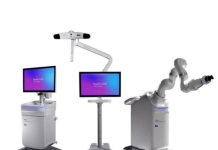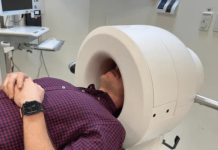Boston Scientific (NYSE:BSX) touted data from a Phase 3 clinical trial of its TheraSphere Y-90 glass microspheres treatment.

In the trial, the TheraSphere treatment successfully met both primary endpoints, including progression-free survival (PFS) and hepatic progression-free survival (hPFS) in patients with metastatic colorectal cancer (mCRC) of the liver.
Marlborough, Mass.-based Boston Scientific’s TheraSphere treatment, a selective internal radiation therapy (SIRT), consists of microscopic glass beads containing radioactive yttrium (Y-90) specifically delivered to target tumors. In the trial, TheraSphere was used as a second-line treatment in combination with standard of care systemic chemotherapy (SOC) for patients who had disease progression during or after first-line chemotherapy, according to a news release.
Findings from the EPOCH clinical trial were presented as late-breaking data at the European Society for Medical Oncology (ESMO) Congress 2021 and will be published in the Journal of Clinical Oncology.
The global, prospective trial randomized 428 patients with mCRC to second-line chemotherapy with or without the addition of the TheraSphere treatment. Both primary endpoints were met, with the addition of TheraSphere in treatment significantly increasing both PFS and hPFS.
Patients who received TheraSphere treatment with second-line chemotherapy were 31% less likely to show disease progression or death and 41% less likely to show hepatic disease progression or death when compared to receiving chemotherapy alone.
“EPOCH is the first positive phase 3 SIRT trial in any disease setting and the data is expected to support our regulatory submission to the U.S. FDA, with the hope that more patients with liver dominant mCRC will gain access to TheraSphere as a treatment option in the future,” Boston Scientific president of interventional oncology, peripheral interventions Peter Pattison said in the release.
Are you hiring?
TheraSphere holds FDA approval for treating unresectable hepatocellular carcinoma (HCC) and breakthrough device designation for expedited review as a treatment for patients with glioblastoma. Currently, use of TheraSphere for treating mCRC in the U.S. is investigational only. Safety and effectiveness have not yet been established for the treatment.




